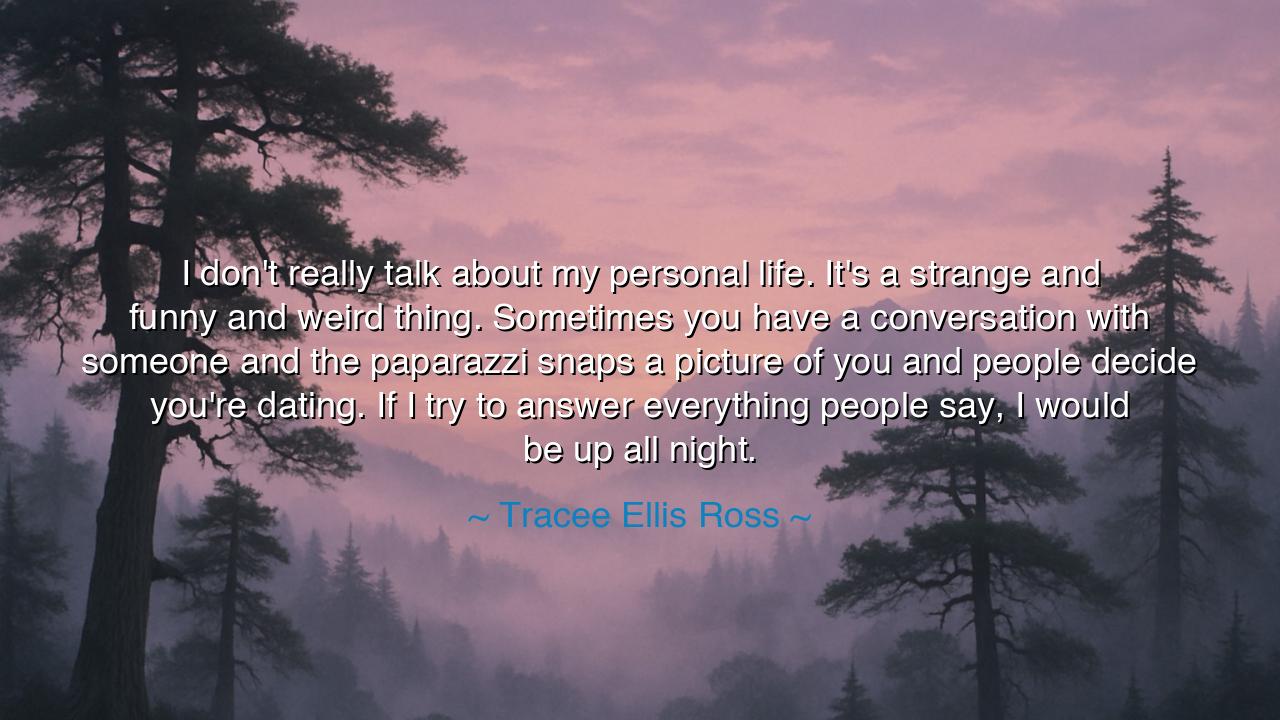
I don't really talk about my personal life. It's a strange and
I don't really talk about my personal life. It's a strange and funny and weird thing. Sometimes you have a conversation with someone and the paparazzi snaps a picture of you and people decide you're dating. If I try to answer everything people say, I would be up all night.






“I don’t really talk about my personal life. It’s a strange and funny and weird thing. Sometimes you have a conversation with someone and the paparazzi snaps a picture of you and people decide you’re dating. If I try to answer everything people say, I would be up all night.” Thus spoke Tracee Ellis Ross, a woman of strength and grace, who has learned the art of silence in the storm. Her words are not only the reflections of one who lives beneath the gaze of the public eye, but also the wisdom of one who knows the sacred value of privacy in an age that worships exposure. For her saying reveals a profound truth: that to guard one’s inner life is an act of self-preservation, and that not all truths are meant to be spoken into the noise of the world.
In every generation, there are those whose faces become mirrors for the desires and projections of others. The artist, the leader, the beloved figure—all live under the weight of perception, which can twist a smile into a rumor, or a simple gesture into a spectacle. Tracee Ellis Ross speaks for them all when she says, “If I try to answer everything people say, I would be up all night.” There is deep exhaustion in chasing every whisper, in trying to correct every falsehood. To attempt it is to surrender one’s peace to the world’s endless chatter. The wise instead learn to walk through the marketplace of opinion with calm detachment, knowing that truth needs no defense when one lives it quietly and well.
The ancients, too, understood this discipline of silence. The philosopher Epictetus taught that what others say about us is beyond our control, and thus not worth our torment. “If someone speaks ill of you,” he said, “live so that none believe it.” And the Buddha, centuries before, spoke of right speech, which is not only about what we say, but also what we choose not to. To remain silent amidst noise is not cowardice—it is mastery. Tracee Ellis Ross, in her restraint, follows this same path: she chooses dignity over explanation, inner peace over endless correction.
Yet beneath her words lies something more profound: the awareness that the world’s hunger for revelation can devour the self if left unchecked. In the modern age, where eyes and cameras follow every movement, where lives are consumed like stories, to withhold one’s truth is to keep one’s soul intact. There is great courage in saying, “I don’t really talk about my personal life.” It is a declaration that the most sacred parts of a person—their love, their sorrow, their quiet dreams—belong not to the public, but to the private realm of the heart. In a culture of confession, silence becomes rebellion.
History offers us many who chose this noble silence. Greta Garbo, the great actress of the early 20th century, became a legend not only for her art, but for her refusal to explain herself. “I want to be alone,” she once said—not from disdain, but from the need to protect her peace. The world longed for her words, but she offered mystery instead, and in doing so, became timeless. Like Garbo, Tracee Ellis Ross reminds us that mystery is a form of power—it keeps the sacred from being trampled by curiosity, and the personal from being reduced to spectacle.
There is also humor in her reflection—“It’s a strange and funny and weird thing.” She sees the absurdity of fame, how one’s image can live a life of its own, divorced from reality. Yet her laughter is not bitter—it is wise. To laugh at the folly of rumor is to rob it of its power. Those who take every judgment to heart become slaves to the crowd; those who can smile at it remain free. Freedom, then, is not the absence of attention, but the refusal to be defined by it.
Let this be the lesson, O listener of future days: guard your inner life. Do not throw the jewels of your soul into the streets for others to trample. Speak when your words can bring light, and hold silence when the world demands to peer into your heart. Not every truth must be explained, not every wound must be displayed. Learn the balance between openness and secrecy, for in that balance lies peace. When others misjudge you, do not chase their approval. Live in such a way that your integrity speaks louder than their noise.
And so, remember the wisdom of Tracee Ellis Ross: the world will talk whether you answer or not. Do not spend your nights defending what needs no defense. Let your life, not your explanations, be your testimony. For the one who keeps their spirit unshaken in the face of gossip, who holds their truth quietly and moves forward in grace—that one lives not as a prisoner of perception, but as a sovereign of their own soul.






AAdministratorAdministrator
Welcome, honored guests. Please leave a comment, we will respond soon